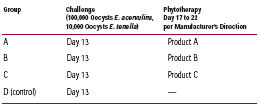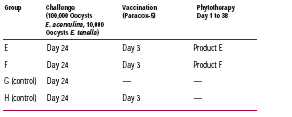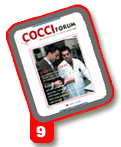Under Scrutiny
Do phytotherapy products have anticoccidial activity or adverse effects on coccidiosis vaccination?
Dr. Isabelle Guillot, Schering-Plough Animal Health, Germany
Dr. Yannick Frémont, France
 Dr. Isabelle Guillot |
In recent years, the animal health
industry has witnessed a huge rise
in the number of phytotherapy
products available. Understandably,
there are questions about the efficacy
of the products and whether they interfere
with coccidiosis vaccination.
Phytotherapy products are mainly
marketed as nutritional supplements or
appetizers.
This has two consequences.
First, there are virtually no regulations
governing these products; for example,
no residue studies are required.
Secondly, the makers cannot make
medical claims. Nevertheless, product
names including "cox" imply anticoccidial
activity.
Efficacy trial against coccidia
To learn if phytotherapy products have
anticoccidial activity, Schering-Plough
Animal Health Corporation initiated
testing of three liquid products by INRA
Tours, a French independent research
center. Except for oregano and chestnut
tannin, product components could not
be identified. Two of the three products
had names that included "cox."
There were four groups of birds in
Trial 1 (Table 1). Three groups received
a phytotherapy product and one group
served as a control. All birds were followed
until Day 34 and were evaluated
for mortality, lesion score, oocyst excretion
and weight gain.
The pertinent
results follow:
- None of the products were effective against coccidia.
- Some of the products resulted in a performance reduction when compared to untreated controls.
- Only one of the products provided an improvement in weight gain 10 days after initiating its administration. Since no action on coccidial multiplication was observed, this effect could be explained by nonspecific immune system stimulation.
Phytotherapy and Paracox®-5 vaccination
 Table1. Protocol for Trial 1. |
Trial 2 was also initiated by Schering-
Plough Animal Health and conducted at
INRA Tours to see if phytotherapy had
any adverse effect on Paracox-5 vaccination
(Table 2). On Day 1, phytotherapy
products were mixed into the feed,
then birds were vaccinated on Day 3.
The results follow:
- The vaccinal response (oocysts per gram or OPG and lesion score after challenge) were not affected by the phytotherapy products.
- In Group F, mortality reached 10%, primarily because birds refused feed containing the phytotherapy product the first 10 days of the trial; weight among surviving birds in this group was significantly less than among birds in other groups, showing that the use of some phytotherapy products is not innocuous.
Impact of oregano on vaccination

Table2. Protocol for Trial 2.
|
 Table3. Protocol for Trial 3.
|
Trial 3 was initiated by Schering-Plough Animal Health and conducted at TGD
Bayern, an independent German
research and diagnostic laboratory,
where the impact of oregano on vaccination
was studied (Table 3). Birds
were vaccinated by gavage.
Oregano
was administered in feed according to
manufacturer recommendations, and
oocyst excretion was recorded daily.
After the end of vaccine excretion
on Day 38, birds were each challenged
with 10 doses of Paracox-5. This nonvirulent
coccidiosis vaccine was used
because the trial site was not isolated.
The trials showed that:
Vaccine response was similar in all
three vaccinated groups. In other
words, oregano did not interfere with
coccidiosis vaccination. In fact, the vaccinated
group that received oregano in
starter feed excreted more oocysts at
Day 10 than other groups.
Oocyst excretion after challenge
was low in all vaccinated groups due to
developed immunity. Coccidial excretion
was higher only in the group that
received oregano, which shows that
oregano has no impact on coccidial
multiplication.
Conclusion
Based on the phytotherapy products tested in these trials, it appears that phytotherapy products have no anticoccidial activity nor do they affect vaccination with Paracox-5.
It is possible that some phytotherapy products that were not tested in these trials might have benefits such as natural growth promotion or regulation of gut flora. If this is the case and poultry producers choose to use a phytotherapy product, it appears that they can do so without fear that the product will interfere with coccidiosis vaccination.
1. Detailed results for all trials in this article are on file at Schering-Plough Animal Health Corporation.Source: CocciForum Issue No.9, Schering-Plough Animal Health.







